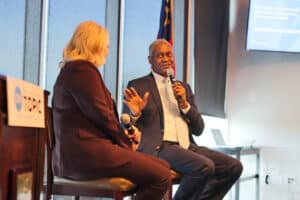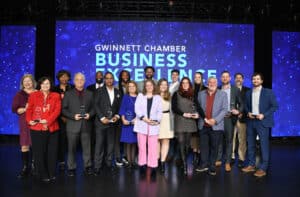Community Sustainability Enterprise partners with financial institutions to provide tools, resources to create more economically stable communities
To become a stable contributing member of the economy, community development practitioner and self-described “change agent” Deirdra Cox believes there are four areas that individuals must address: mental and physical wellness, educational attainment, workforce/career development and, only then, financial literacy/capability. These four pillars form the basis of
Community Sustainability Enterprise (CSE), Cox’s organization dedicated to building economically thriving and diverse communities in Gwinnett County and around the metro Atlanta area.
Along with her business partner Rhonda Anderson, Ph.D., Cox partners with banks, corporations, municipalities, school districts and other organizations to educate and create upwardly mobile economic opportunities for low-income populations.
Some children are taught, or learn by example, to become economically self-sufficient and successful adults. However, Cox noticed during her 36-year banking career that in the low- and moderate-income community, there were many adults who were missing that education.
“When I looked at why people went into foreclosure, that was of great interest to me. When I looked at why people were purchasing more than they could really afford and we were still giving them loans, that was of great interest to me,” she said. “I didn’t see minorities, I didn’t see African Americans and the Hispanic population, I didn’t see them properly equipping themselves.”
With CSE, Cox and Anderson want to create upwardly mobile economic contributors to create flourishing communities. CSE’s partnership with banks and other organizations enables them to do that. These partners sponsor, provide experts and help create content for CSE’s classes (now 100% online). In turn, Cox and Anderson’s team helps their clients develop and implement Community Reinvestment Act goals; diversity, equity, and inclusion (DEI) programs; and the next generation workforce.
One of CSE’s current clients is Habitat for Humanity. Cox and Anderson are working with the organization’s new homeowners to reach next level self- sufficiency and sustainability and existing homeowners to reach new levels of upward economic mobility.
CSE also helped Peach State Federal Credit Union build out a platform to open a branch inside Central Gwinnett High School. Students were hired to run the branch, and some have even been promoted to positions within the Credit Union. “That’s a success for us because many of those students have now surpassed their families’ income earning potential because of the opportunity that Peach State has given them,” Cox said.
The bank branch at Central Gwinnett High School echoes back to one of Cox’s first big community-based projects. Working with BrandBank (now Renasant), Cox opened a branch office in Meadowcreek High School to serve the unbanked and underbanked as well as teach financial literacy. It was this experience that solidified the need of CSE’s four pillar approach.
“We walked in teaching financial literacy but then we looked and said well these kids aren’t paying attention,” Cox said. “That’s when we realized there were other issues they were struggling with. Some of the kids were homeless. Some of the kids’ parents had been deported. So we really had to meet them where they were.” Cox realized coming in and just teaching financial literacy did not ensure financial success. To do that, each of the four areas named in her core pillars needed to be addressed to create self-efficacy.
“I learned growing up that your mental frame of mind is very important. It will determine your altitude in life. Your body has to align with your physical self-care so you can see yourself doing better, you can see yourself as being someone,” she explained. Obtaining an education to hone a skill set and figuring out how to become a subject matter expert is the next step, then defining a career path that enables a student to provide for themself and their family. The final pillar includes learning the financial skills to manage money so home ownership and/or entrepreneurship can be successfully achieved and sustained.
These four pillars have been a recipe for success for CSE. “We deliver real results for the community that we serve. It’s not just about checking the box,” Anderson said. “We create outcomes that produce individuals who are on that trajectory of creating a more sustainable life for themselves. Like [Cox] always says, it’s not a hand out, it’s a hand up.”
Not only does CSE produce real results in the community, it creates real results for its corporate partners, too. Many companies have turned to CSE to help with corporate responsibility and DEI programs. “We teach them how to take their initiatives and make them actionable,” Cox said. “What does putting $2 million into a DEI program look like? What does it accomplish? Because at the end of the day if you can’t show what it looks like and produce outcomes, it really doesn’t matter.”
Recently appointed to the Board of Directors for the Gwinnett Chamber of Commerce, Cox hopes to achieve similar meaningful results. “Of course I want everybody to get to know who we are and what we do,” she said. “I also want to create other opportunities for People of Color. I want people to see that people can navigate new terrain; that we can walk in the newness of now and create a difference for tomorrow.”
One of the ways she hopes to be effective is helping Chamber members build truly impactful hiring practices that look beyond checking the diversity box. “I don’t want somebody hired just because they’re diverse. I want them hired because they are a person of excellence and because they will meet the criteria of the position and because you can see that you can grow them within your organization,” she said. “I want to support the Chamber and its members so that we can see People of Color rising to new levels of competence.”
Creating learning and workforce opportunities is one of the main areas Cox and Anderson are focused on now. They hope to create relationships with business leaders in growing industries, such as hospitality, the culinary arts, commercial construction, manufacturing, IT, medical and logistics. “We want to help cultivate the next generation workforce in partnership with them,” Cox said. “We want to put people to work.”






